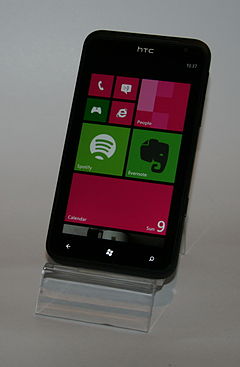Windows Phone 7
| A version of the Windows Phone operating system | |

Windows Phone 7 home screen
|
|
| Developer | Microsoft Corporation |
|---|---|
| Source model | Closed-source |
| General availability |
|
| Latest release | Windows Phone 7.8 (Build 7.10.8862.144) / March 13, 2013 |
| Update method | Zune Software |
| Platforms | 32-bit ARM architecture |
| Kernel type | Monolithic (CE-based) |
| License | Commercial proprietary software |
| Preceded by | Windows Mobile 6.5 |
| Succeeded by | Windows Phone 8 |
| Official website | Archived official website at the Wayback Machine (archive index) |
| Support status | |
| Unsupported as of October 14, 2014. | |
Windows Phone 7 is the first release of the Windows Phone mobile client operating system, released worldwide on October 21, 2010, and in the United States on November 8, 2010. It received multiple large updates, the last being Windows Phone 7.8, which was released in January 2013. It added a few features backported from Windows Phone 8, such as a more customizable start screen.
Microsoft ended support for Windows Phone 7 on October 14, 2014. It was succeeded by Windows Phone 8, which was released on October 29, 2012.
Microsoft officially unveiled the new operating system, Windows Phone 7 Series, at the Mobile World Congress in Barcelona on February 15, 2010, and revealed additional details at MIX 2010 on March 15, 2010. The final SDK was made available on September 16, 2010.HP later decided not to build devices for Windows Phone, citing that it wanted to focus on devices for its newly purchased webOS. As its original name was criticized for being too complex and "wordy", the name of the operating system was officially shortened to just Windows Phone 7 on April 2, 2010.
On October 11, 2010, Microsoft's CEO Steve Ballmer announced the 10 launch devices for Windows Phone 7, made by HTC, Dell, Samsung, and LG, with sales beginning on October 21, 2010 in Europe and Australia and November 8, 2010 in the United States. The devices were made available on 60 carriers in 30 countries, with additional devices to be launched in 2011. Upon the release of Windows Phone 7's "Mango" revision, additional manufacturers became partners, including Acer, Fujitsu, and ZTE.
Windows Phone initially supported twenty-five languages, with applications being available through Windows Phone Store in 35 countries and regions. Support for additional languages and regions were subsequently brought through both the Mango and Tango updates to the OS respectively.
...
Wikipedia
